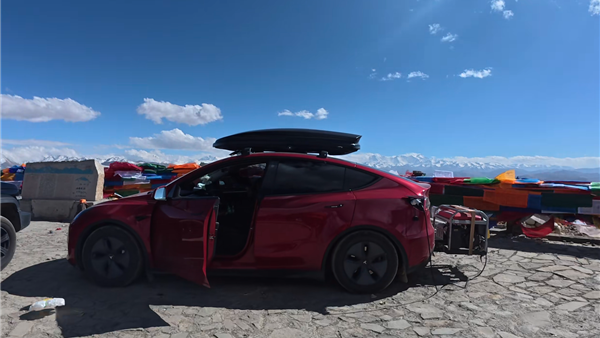A resourceful Tesla owner in China has taken electric vehicle travel to new heights by modifying their car into an “extended-range” version to tackle the challenging journey to the Mount Everest viewing platform. This innovative approach eliminates range anxiety in remote areas with scarce charging infrastructure.
Facing the limitations of charging stations outside urban areas, the owner installed an 8kW gasoline generator on the rear of their Tesla. To comply with regulations, a license plate was affixed to the generator. The generator produces AC power, which is then fed into a power strip, allowing the owner to use the vehicle’s standard charger to replenish the battery.
The modified Tesla successfully reached the Mount Everest viewing platform in Lazi County, situated at an altitude of over 5300 meters. Even at this extreme elevation, the owner reported that the generator could provide a charging power of 3kW. This translates to an estimated 19 kilometres of added range per hour. While a full charge using the generator would take approximately 9 hours and 30 minutes, the owner noted that the primary goal is not to charge the battery with the generator fully but to add enough range to reach the next available charging station or provide emergency power when needed.

The owner stated that the generator cost 2800 yuan (390 USD). When using the generator for power replenishment, gasoline costs roughly 1 yuan (14 cents) per kilometre. However, the generator is only used when suitable charging options are unavailable, making the emergency use cost manageable.

Having conquered the trip to Everest, the owner’s next ambitious plan is to explore the uninhabited areas of Tibet, further demonstrating the potential of their self-made extended-range electric vehicle for adventurous travel.
Editor’s comment
Rather than calling this an EREV, it’s more accurate to say the car travels with a power generator. This isn’t a true range extender capable of charging the battery while driving, and it’s not economically viable. Even considering the higher cost of highway charging, the typical operating cost for an electric vehicle in China is generally no more than 0.4 yuan per kilometre. Moreover, 98% of highway service areas across China are now equipped with fast charging stations. However, given that the owner was travelling to Tibet, often referred to as the ‘Roof of the World,’ this level of range anxiety is perhaps understandable.



